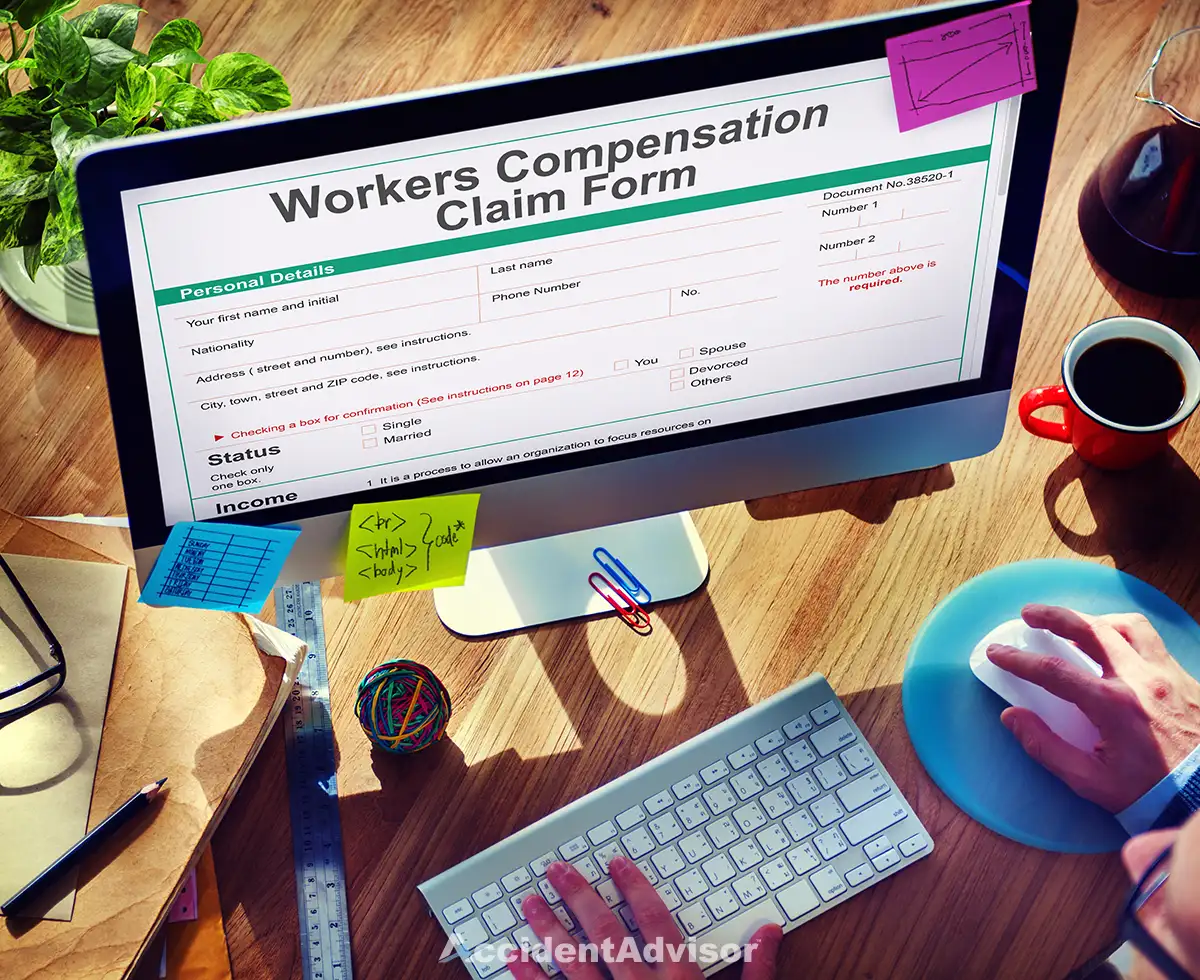The workers’ comp claim process begins with your employer filing your case after a workplace accident or injury. However, not everything always goes smoothly once the case gets to the insurers. Often, administrators from the insurance company will deny a workers’ comp claim or reduce the expected benefits depending on the situation.
In fact, about 50% of all workers’ compensation claims are denied compensation. Learn the factors that influence the workers’ comp claim process, how long it usually takes, and how to negotiate a settlement to ensure your case ends up in the half that gets approved.
Contact an experienced workers’ comp attorney to learn more about your eligibility for compensation and how you can get the settlement you deserve.
Table of Contents
- What To Do After a Work Injury?
- Workers’ Comp Claim Process
- Factors that Influence Workers Comp Settlements
- How Long Do Workers Comp Settlements Take?
- Negotiating a Workers’ Comp Settlement Offer
- Workers’ Comp Claim Statute of Limitations
- What To Do If Your Worker’s Comp Claim is Denied?
- Can You Be Fired After a Workers Comp Claim?
- What If Your Employer Refuses to File a Workers Comp Claim?
- Should You Hire a Workers’ Comp Lawyer?
- Conclusion
What To Do After a Work Injury?
Immediately after a work injury, you should notify your supervisor so they can begin their investigation. Without this proper notification, the insurer could claim later that your injury wasn’t work-related.
Next, you should focus on documenting your accident since proof of injury is important to a successful claim. This includes taking photos of the scene, getting copies of your business’s safety procedures, and collecting the contact information of any witnesses.
Medical documentation is also important in a successful workers’ compensation claim. You should seek medical help immediately from on-site personnel, if available – never refuse medical attention as this could be construed later as downplaying your injuries. See an emergency doctor or primary physician as soon as possible after your accident so that your injuries can be clearly documented.
Note that workers’ comp only covers monetary expenses for medical injuries and related treatments. Unlike personal injury lawsuits, workers’ comp does not settle with workers for their pain and suffering.
Additionally, you may be wondering what to do in the case of a chronic injury since there may not be any witnesses or accident scenes to document. These injuries are more difficult to link to your job since they occur over a long period, often as the result of repetitive motions.
The workers’ comp claim process for a chronic injury is similar in that your employer’s records and doctor’s notes remain important evidence in your case. However, the insurance company will demand more specific evidence concerning how your injury was caused by your employment, so an experienced workers’ comp attorney is particularly helpful in these cases.
Workers’ Comp Claim Process
The workers’ comp claim process begins as soon as you are injured (or as soon as you are diagnosed, in cases of chronic injuries). Every state has different regulations on workers’ compensation, which could slightly change the process.
However, these steps typically remain the same:
- Report the injury right away to your employer or supervisor, either in person or in writing. Businesses may have deadlines for reporting injuries, so check to see if you’re following the right procedure.
- Get medical treatment as soon as you can to document your injury. Schedule a visit to your doctor or the emergency room and tell them the details that connect your injury to what you were doing at work. This will allow them to document your work as the cause of the injury, an important step in a successful workers’ compensation claim.
- Look over the workers’ comp insurance materials, which will be sent to you by your employer’s insurer. They will detail your benefits and when you can expect to receive them if your claim is approved.
- Resolve any issues you may have with the benefits package or schedule before filing your claim. Many states have “good faith laws” that require any disputes to be handled before claims are processed.
- Hire a workers’ comp attorney to get help with negotiating your benefits (if necessary) and filing your claim. While workers’ comp attorneys and personal injury attorneys often overlap, they are not always identical. Look for someone with experience in cases like yours.
- File your claim within 30 days of your accident or diagnosis. Your employer may give you the approved claim forms or they may file them for you. If you have to do it yourself, you will be asked questions about the injury, including the extent and location of the damage, the time and date of the accident, the witnesses, the medical treatments you received, and your account of how the incident happened.
- You may have to recount the incident before a judge if your claim has an official hearing, often when there’s some dispute.
- You can re-open a work injury claim to the Court of Appeals if you are not satisfied with the benefits you received.
Factors that Influence Workers Comp Settlements
The factors that influence workers’ comp settlements include the monetary damages you sustained as well as any additional costs you are predicted to spend. These costs include:
- The medical costs of treating your injury now as well as predicted future costs
- Lost wages in the present as well as lost earning potential in the future
- Retraining costs to continue at your job or switch to a new one
- Payments for disability, both temporary and permanent
- Legal fees
In addition to covering these costs, different states have unique rules about workers’ compensation regulations that can affect your final workers’ comp settlement.
How Long Do Workers Comp Settlements Take?
Workers’ comp settlements take an average of 15 months to resolve. But every case is different, depending on the evidence required to back up your claim and how willing the insurance adjuster is to approve it.
This means that you could realistically be waiting over a year for your settlement to resolve, accruing medical costs in the meantime related to your injury, which will hopefully be reimbursed by your employer’s insurers. Some cases can be settled in just a few weeks, but this is not the norm.
The reason is simply that insurance adjusters cannot afford to reimburse every claim, so they have to take time processing the evidence to determine which they will accept and deny.
Negotiating a Workers’ Comp Settlement Offer
If you aren’t happy with the terms of your workers’ comp settlement offer, you can negotiate them. One of the main points of negotiation is to receive a lump-sum settlement all at once rather than receiving compensation as weekly payments.
The reason you might do this is that disability payments require continued approval by the insurer, which can be a hassle. Lump-sum settlements are more desirable since they’re more certain.
You may also want to negotiate the terms of the compensation before a claim is even filed. Since your employer will hope to avoid a personal injury lawsuit, they will likely be open to negotiating your benefits, within reason.
Workers’ Comp Claim Statute of Limitations
The statute of limitations on workers’ comp claims varies by state but is typically between 1 and 3 years. Some states such as Nevada offer only 90 days from the injury date to get the proper forms signed while Minnesota gives workers 6 years from the date of the incident to file their claim.
Some states even change the statute based on the type of injury claim. For example, some states like Maryland have different statutes for acute and chronic illnesses, giving workers 2 years to file after an incident but only 1 year after discovering the symptoms of a chronic illness.
Some states also require different forms and procedures, each with its own timelines. Ask your attorney if they know the statute of limitations requirements for your state before hiring them.
What To Do If Your Worker’s Comp Claim is Denied?
If your workers’ comp claim is denied, you can file an appeal with a state-specific document, sometimes called a Petition for Benefits or a Claim Petition for Compensation. This needs to be filed within an amount of time determined by your state’s regulations, but we recommend doing it as soon as you can.
Use the insurer’s letter to figure out why your claim was denied before deciding to file an appeal. Failure to file on time, lack of evidence, and a pre-existing condition are several reasons why many claims are denied.
Remember not to give up after the initial rejection since many life-changing settlements have been won in appeals.
Can You Be Fired After a Workers Comp Claim?
Many states have laws in place that deny an employer the ability to fire or threaten to fire workers who filed a valid workers’ comp claim. It is also illegal for an employer to keep any portion of the benefit for themselves.
Workers’ comp exists to compensate workers for injuries they sustained on the job. They do not surrender additional employment benefits or risk termination by collecting the benefits they are owed.
However, if you file a personal injury lawsuit because you believe the workers’ comp benefits are insufficient and your employer could be at fault for your injuries, you will likely endanger your job and surrender your other employment benefits by doing so.
What If Your Employer Refuses to File a Workers Comp Claim?
If your employer refuses or even forgets to file a workers’ comp claim for your injury, you can sue them for negligence. Refusal to pay workers for their injuries is against the law in most states.
Remember that a successful case against a negligent employer requires that the worker has followed the correct steps to make their claim. If you are beyond the statute of limitations, you will have a much weaker case.
In the case of a civil lawsuit against a negligent employer, you may not only win compensation for your injuries but additional damages as well, such as pain and suffering.
Should You Hire a Workers’ Comp Lawyer?
You should always hire a workers’ comp lawyer to handle your claim due to the complexity of the information involved, the state-specific fine print of the statute of limitations, and the experience required to successfully negotiate a work injury claim.
Sometimes, your employer will file your paperwork for you and support you all the way. However, in many cases, workers are on their own to file for their benefits on time or even negotiate the terms of their compensation.
An experienced attorney can help to make sure your case stays on schedule, contains all the proper evidence, and either gets approved or is properly appealed when the time comes.
Conclusion
Workers’ comp pays employees for the monetary damages they sustain or are predicted to sustain in the future from an occupational injury, including long-term illnesses. Even if your claim is denied, you can still receive compensation through an appeal. Contact a workers’ comp attorney to learn about your eligibility for benefits related to your injury or illness.

Rocky Horton
Author
Rocky Horton is a health and safety expert from Chapel Hill, NC. He is the founder of AccidentAdvisor and has been featured in Forbes, Bloomberg, and other publications. Learn more.













